In the loud, frenetic world of Afrobeats—where stars are born on Instagram feeds, where global festivals echo with Nigerian choruses, and where egos spar as loudly as the drums—one man continues to rule without raising his voice.
His strategy is not a trumpet but a whisper, not a public spectacle but a private calculation. He walks into a room, and the temperature shifts, though few can explain why. His presence is soft but unshakable, his influence invisible yet everywhere.
Don Jazzy, the producer who rarely sings, the mogul who rarely brags, has built something greater than fame: an empire that survives storms, reinvents itself in silence, and thrives where others stumble. Mavin Records is not just a music label; it is the carefully drawn blueprint of a man who understands that power often works best when hidden.
To fathom Don Jazzy’s quiet strategy, one must peel back the layers of his journey—not in the noise of hit singles or the glamour of red carpets, but in the subtle decisions, the near-invisible moves, and the timing that has made his empire endure. It begins not in Lagos’ bustling nightlife, but in quieter rooms, years before Afrobeats became a global language.
Before the Empire – The Making of Don Jazzy
Every empire has a seed moment—a time when the future ruler is still learning the weight of his tools. For Don Jazzy, that seed was planted in the unlikely soil of Ajegunle, Lagos, where the raw pulse of Nigeria’s street culture shaped his early ears. Born Michael Collins Ajereh in November 1982, Jazzy grew up in a middle-class Nigerian family that valued education and music alike.
His father, an Isoko man with an ear for traditional rhythms, and his mother, of Igbo descent, gave him a childhood that fused cultural heritage with urban survival.
Music was not an accessory in his youth—it was the fabric. As a boy, he learned percussion in church, where rhythms were not entertainment but devotion. The church setting, like for many Nigerian musicians, was an unsung academy, shaping his instinct for arrangement, harmony, and timing. He was not the soloist basking in applause; he was the accompanist, the one who ensured the voices of others rose in balance. Even then, his gift was not to dominate sound but to shape it.

When his family moved to London in the early 2000s, Don Jazzy carried this quiet gift with him. London was both alien and familiar—Nigerians abroad had carved small cultural enclaves, and Afro-inspired sounds thrived underground long before the mainstream noticed. While others hustled for quick breakthroughs, Jazzy learned patience. He worked odd jobs—security guard, McDonald’s staff—yet every coin earned was balanced with hours in the studio. It was in London that he met D’banj, the charismatic performer who became his earliest creative partner.
Together, they formed Mo’Hits Records in 2004. Their chemistry was undeniable: D’banj was flamboyant, loud, and commanding, while Jazzy was reserved, technical, and meticulous. Where D’banj performed, Jazzy composed. Where D’banj chased cameras, Jazzy built soundscapes. Their partnership mirrored a cultural truth: every king needs a strategist, every star needs a shadow.
Mo’Hits was more than a label; it was the crucible of modern Afrobeats. Songs like “Tongolo,” “Why Me,” and the iconic album Curriculum Vitae redefined Nigerian pop in the mid-2000s. Don Jazzy’s production stood out for its precision. He combined the raw street sounds of Lagos with Western R&B influences, but more importantly, he understood restraint. His beats were never overcrowded; they left room for performance, personality, and rhythm to breathe.
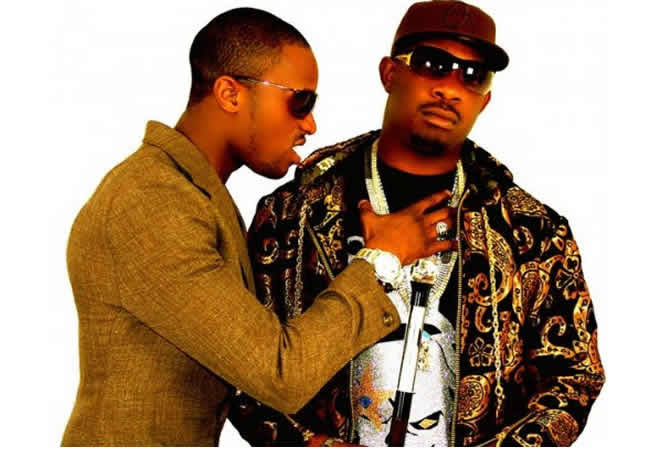
By the late 2000s, Mo’Hits had become a continental powerhouse. D’banj was everywhere, and Don Jazzy’s signature voice tag—“It’s Don Jazzy again!”—had become an anthem of assurance. Yet inside the empire they had built, cracks were forming.
The partnership that had once thrived on contrast began to suffer under pressure. D’banj’s desire for global stardom clashed with Jazzy’s quieter ambition. In 2011, as international deals beckoned, including a now-famous alignment with Kanye West’s G.O.O.D. Music, tensions reached their breaking point. By 2012, Mo’Hits collapsed, shattering one of Nigeria’s greatest musical alliances.
For many, the fall of Mo’Hits was the end. But for Don Jazzy, it was the beginning of something larger. He had studied the rise, managed the chaos, and endured the fall. He had seen how noise can destroy an empire. And so, in the silence that followed, he began sketching a new plan—one that would rely not on flamboyance, but on quiet strategy.
The Birth of Mavin Records – Building After the Fall
Empires often emerge in the silence after collapse. When Mo’Hits crumbled in 2012, the Nigerian music scene buzzed with speculation. Could Don Jazzy survive without D’banj? Could the quiet producer command attention without his flamboyant partner? In an industry where personalities were often louder than artistry, it seemed improbable. Yet Don Jazzy had already chosen his strategy: not reinvention through noise, but rebirth through patience.
The ashes of Mo’Hits became the soil for a new idea. In May 2012, Don Jazzy unveiled Mavin Records. The name carried weight beyond branding—it meant “expert,” “genius,” a craftsman at the height of his art. This was not merely another label; it was a manifesto. Where Mo’Hits had been built on the magnetic energy of one star and his producer, Mavin would be built on a system, a pipeline, and a structure designed to outlive individuals.
The first test came immediately. Don Jazzy assembled an initial roster: Dr Sid, D’Prince, and Wande Coal (All part of Mohits record) and Tiwa Savage. These were not unknowns; they were artists with existing fan bases, each with their own identity. But the challenge was clear—without D’banj’s star power, could Mavin establish itself as Nigeria’s next powerhouse?
The answer arrived swiftly with the Solar Plexus compilation album, Mavin’s first major release. Though the project received mixed reviews, it was not meant to be perfect. It was a declaration of survival, proof that Don Jazzy could regroup, reorganize, and remain relevant. Tiwa Savage, in particular, emerged as Mavin’s crown jewel. Already a songwriter with international experience, Tiwa embodied a global polish that matched Don Jazzy’s vision. Her debut album under Mavin, Once Upon a Time, became a landmark, fusing Afro-pop with R&B sophistication.
But even in these early years, Don Jazzy’s strategy was visible. Unlike other labels that centered entirely around their CEO or one breakout star, Mavin positioned itself as a collective, a machine with multiple engines. Tiwa was marketed as the female pioneer of modern Afrobeats, Wande Coal as the soulful voice, Dr Sid as the versatile performer, and D’Prince as the youthful bridge. This diversity of sound and personality gave Mavin resilience: if one faltered, another could rise.

Still, the road was not smooth. In 2013, Wande Coal exited Mavin after disputes, a blow that could have destabilized the young label. But Don Jazzy handled the situation with his trademark quietness. There were no public battles, no scorched-earth interviews. He let silence protect the brand. In the Nigerian music industry, where feuds often double as marketing, Don Jazzy chose restraint as a weapon. His refusal to feed controversy made Mavin appear stable, dependable, and future-focused—a subtle but powerful branding strategy.
Then came Tiwa Savage’s golden era. Between 2013 and 2015, her songs—“Eminado,” “My Darlin,” and countless features—dominated airwaves. Tiwa became not just a singer but a symbol: a woman who could stand tall in a male-dominated industry, carrying Mavin on her shoulders while expanding the label’s reach. By association, Mavin became synonymous with class, structure, and global ambition.
But Don Jazzy was not content with one star. He was watching the streets, searching for the next sound, the next generation. His genius lay not in clinging to present success but in anticipating cultural shifts before they became obvious. By 2014, he was already experimenting with collaborations that hinted at where Mavin would go next.
And then came 2015, the year Mavin cemented itself as an empire-in-waiting.
The “Dorobucci” Moment
If Mo’Hits had given Nigeria “Oliver Twist” as its defining anthem, Mavin had its own turning point with “Dorobucci.” Released in May 2014, the song was more than music—it was a movement. Featuring nearly every Mavin artist, “Dorobucci” introduced a new kind of branding: the “Mavin Nation.”
“Dorobucci” was deliberately playful, its lyrics simple and its beat infectious. But beneath the surface, Don Jazzy had embedded strategy. Each artist’s verse was tailored to highlight their persona—Tiwa’s elegance, Dr Sid’s versatility, D’Prince’s energy, Don Jazzy’s playful leadership, Reekado Banks’ voice, others . The song was not about one star; it was about unity. Nigerians didn’t just sing along; they joined a collective identity. “I am Dorobucci” became a cultural catchphrase.
Here, Don Jazzy revealed one of his quietest but sharpest tools: community branding. Where other labels marketed artists individually, Mavin marketed an entire nation. It was a subtle psychology—fans felt like they belonged to something larger than music, a family with its own language, style, and rituals. The Mavin Nation wasn’t just listening; they were participating.
By the end of 2015, Mavin was not just surviving—it was thriving. Tiwa Savage had become a continental superstar, “Dorobucci” had redefined collective branding, and the label had weathered early storms without collapsing. But Don Jazzy was already looking ahead. He knew that Afrobeats was shifting toward a younger generation, and that global attention was hovering just beyond the horizon.

So, while the world was dancing to “Dorobucci,” Don Jazzy was quietly preparing his most ambitious move yet: transforming Mavin from a Nigerian powerhouse into a global Afrobeats empire.
The Business Strategy Behind Mavin’s Expansion (2016–2019)
By 2016, Afrobeats was no longer just a Nigerian affair—it was echoing in London clubs, slipping into American playlists, and catching the curiosity of global labels. Yet inside Nigeria, the industry remained volatile. Labels often rose quickly and fell faster, undone by poor contracts, short-sighted strategies, or ego clashes. Don Jazzy knew this terrain intimately, having lived through Mo’Hits’ implosion. For Mavin to last, it could not merely be a talent hub; it had to be a system.
A)The Corporate Turn
In January 2019, news broke that would redefine the perception of Mavin Records: Mavin secured a multi-million-dollar investment from Kupanda Holdings, a joint venture between Kupanda Capital and TPG Growth. The deal was unprecedented. Nigerian labels were usually self-funded or built around short-term partnerships, but Don Jazzy had convinced global investors that Mavin was not just a music house—it was a scalable business model.
The announcement rippled across the industry. For years, Mavin had been seen as an incubator of stars, but this investment reframed it as an empire-in-progress, comparable to America’s Def Jam or South Korea’s SM Entertainment. What set Mavin apart was not just the money but the structure that Don Jazzy had been quietly building.
He had been meticulous about contracts, creating clear revenue-sharing models that reduced disputes. He had invested in artist development, offering not just beats but branding, mentorship, and digital positioning. In a country where young artists were often signed and abandoned after one hit, Mavin’s model felt different. It was long-term, deliberate, and scalable.
B) Tiwa Savage: The Test Case of Global Transition
The years leading up to the Kupanda deal had already shown hints of Don Jazzy’s foresight. Tiwa Savage, Mavin’s flagship artist, became the first clear experiment in global crossover. In 2016, she signed with Roc Nation, Jay-Z’s entertainment company, a partnership that symbolized Afrobeats’ potential in America.
Tiwa’s journey was not without bumps. Her Roc Nation era produced limited U.S. chart success, but it expanded her visibility, laying groundwork for future female Afrobeats stars like Ayra Starr and Tems. Don Jazzy’s support during this period was telling: rather than hoard Tiwa for Mavin alone, he allowed her brand to stretch across borders, using her as proof of concept that a Mavin artist could compete internationally.
By 2019, Tiwa Savage had left Mavin for Universal Music Group, a move that sparked rumors of discord. But Don Jazzy’s handling of her exit again revealed his quiet strategy. There were no public accusations, no bitterness. Instead, he positioned Tiwa’s departure as a graduation, proof that Mavin could nurture talent and launch it into the global arena. In a way, her exit boosted Mavin’s credibility—if one could rise that high under Don Jazzy’s system, then the system itself was working.
C) Building the Next Generation
While Tiwa was scaling new heights, Don Jazzy was already seeding the next wave of stars. Between 2016 and 2019, he signed Johnny Drille, Ladipoe, and DNA Twins, diversifying Mavin’s soundscape.
Johnny Drille was an unexpected choice—a folk-inspired artist in a market dominated by club hits. Many questioned the business sense of signing him, but Don Jazzy was playing a different game. Johnny’s uniqueness reinforced the message that Mavin wasn’t chasing trends; it was building a diverse ecosystem.
Ladipoe, with his lyrical dexterity, became another symbol of patience. In a landscape where rap was struggling commercially, Don Jazzy gave him time to grow, proving again that Mavin valued longevity over quick returns.
These signings showed the “portfolio approach” of Don Jazzy’s empire. Instead of betting on one star, he spread investment across varied talents, creating resilience against shifts in musical trends.
D)The Rise of Rema: A Global Bet
Then came the game-changer: Rema.
Signed in March 2019, Rema represented the clearest expression of Don Jazzy’s global vision. A teenager from Benin City, Rema embodied a futuristic sound—Afrobeats blended with trap, pop, and Indian influences. His debut EP was not only a Nigerian success but a global spark. Songs like “Dumebi” went viral beyond Africa, attracting attention from global tastemakers and streaming curators.
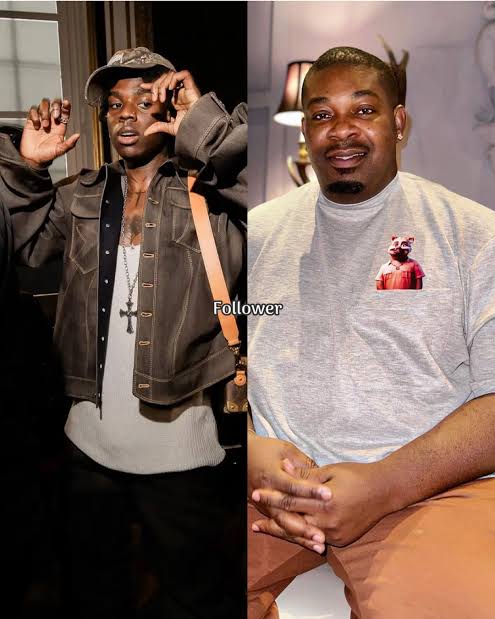
Rema was marketed differently. Don Jazzy and his team pushed him not just as a Nigerian star but as an international pop act from day one. His visuals, fashion, and sound were crafted to travel. By the time the Kupanda investment was announced, Rema was already the jewel of Mavin’s next phase—the proof that Don Jazzy’s empire could produce global-ready artists.
The Strategy Beneath the Silence
What made all this remarkable was not just the signings or the hits but the silence with which Don Jazzy moved. While competitors battled for headlines, he was negotiating corporate deals, diversifying rosters, and plotting global expansion.
Mavin’s growth in this period can be distilled into three quiet strategies:
1. Diversification of Talent: From Tiwa to Rema, Mavin avoided the trap of over-dependence on one sound or star.
2. Corporate Positioning: The Kupanda deal reframed Mavin from a local label to an international business entity.
3. Silent Succession Planning: By supporting Tiwa’s global exit while nurturing Rema’s rise, Don Jazzy proved that Mavin’s strength lay not in individuals but in the system itself.
By 2019, Mavin was no longer just a Nigerian powerhouse. It was a quietly engineered empire, structured to last beyond trends, beyond individuals, and beyond borders.
And as Afrobeats entered its global breakout, Mavin was perfectly positioned to ride the wave—without ever having made noise about it.
The Cultural Impact of Mavin Empire (2020–2022)
By the time the world stumbled into the chaos of 2020, Afrobeats had already secured its seat at the global table. But where many saw Afrobeats as a genre defined by a handful of loud stars—Wizkid, Burna Boy, Davido—Don Jazzy was shaping a subtler narrative. Mavin wasn’t competing for the loudest headline; it was constructing culture from the inside out.
A) The Gender Balance Gamble
For years, Nigerian music had suffered from a glaring imbalance: male artists dominated, while women were often sidelined or treated as exceptions. Don Jazzy understood that for Mavin to be more than just another record label, it needed to rewrite that script.
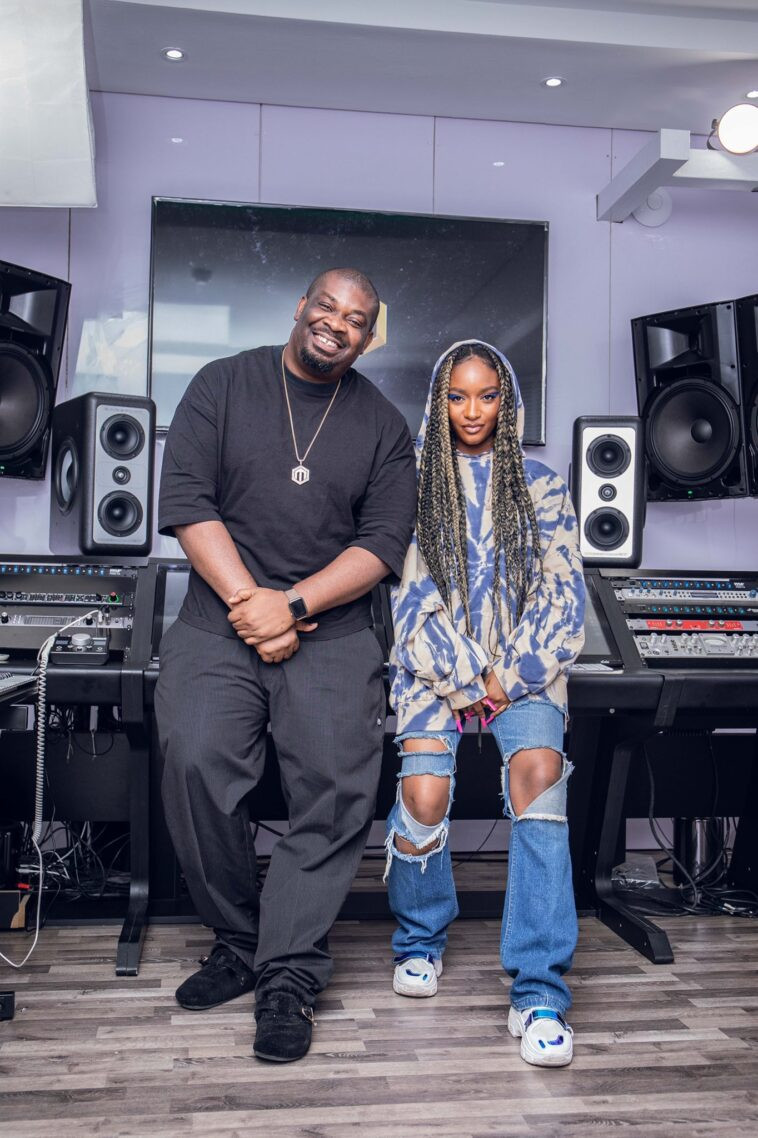
The signing of Ayra Starr in January 2020 was the clearest move in this direction. Barely 18 at the time, Ayra arrived with a confidence that seemed beyond her years. Her debut EP, self-titled Ayra Starr, was a sonic manifesto—a blend of Afropop and Gen-Z bravado. Songs like “Away” resonated with young listeners, not just in Nigeria but across Africa and the diaspora.
Ayra represented more than music. She embodied a new cultural archetype: the unapologetic, global-ready Nigerian female star. Her fashion was bold, her lyrics unfiltered, and her presence magnetic. For Don Jazzy, she was both an artistic gamble and a cultural statement—proof that Mavin could shape the future by amplifying voices the industry had long overlooked.
Within two years, Ayra Starr was no longer a gamble but a global name. Her 2021 single “Bloody Samaritan” became the first solo song by a female Nigerian artist to top the TurnTable charts, a feat that reflected both the strength of her artistry and Mavin’s strategic positioning. She was not marketed as a “female act” but as a star, period.
Don Jazzy doubled down by adding Lifesize Teddy in 2023, another bold choice that cemented Mavin as a home for female talent in an industry still catching up. This commitment to gender balance was not a loud declaration; it was a quiet strategy that reshaped perceptions.
B)The Digital Playbook
If Mavin had mastered the stage in the 2010s, the 2020s demanded dominance in a different arena: digital culture.
Don Jazzy, ever the quiet strategist, became one of the most effective digital moguls in Africa. His Instagram presence was not an afterthought—it was a deliberate extension of Mavin’s brand. Unlike peers who used social media for braggadocio, Don Jazzy turned himself into a meme-like figure: approachable, humorous, and endlessly relatable.
This relatability was strategic. Fans did not see a distant mogul; they saw a “big brother” who could joke about crushes, dance clumsily, and laugh at himself. The effect was profound: Mavin’s brand felt accessible, even as it grew into a corporate empire.
Meanwhile, Mavin’s younger stars thrived on TikTok and YouTube, platforms that had become central to Afrobeats’ global rise. Rema’s “Calm Down,” released in 2022, epitomized this. The song became not just a hit but a viral phenomenon, propelled by TikTok dances, Instagram reels, and global remixes. By the time Selena Gomez jumped on the remix, “Calm Down” was already one of the most streamed Afrobeats songs in history.
This digital-first approach wasn’t accidental. Mavin invested heavily in content creation, visual storytelling, and platform optimization. Music videos became cinematic, release strategies became algorithm-aware, and every artist’s personality was tailored for virality. The quiet strategy wasn’t just about making hits—it was about embedding them in the rhythms of digital life.
C) Mavin Nation 2.0 – Rebuilding Community
The “Dorobucci” era of 2014 had introduced the idea of the Mavin Nation—a collective identity that went beyond individual artists. By the early 2020s, Don Jazzy revived and retooled that concept.
In 2021, the label celebrated its ninth anniversary with coordinated campaigns, throwback moments, and new signings. Fans weren’t just consuming music; they were participating in a movement. Hashtags trended, old songs resurfaced, and new fans felt connected to a lineage larger than any one star.
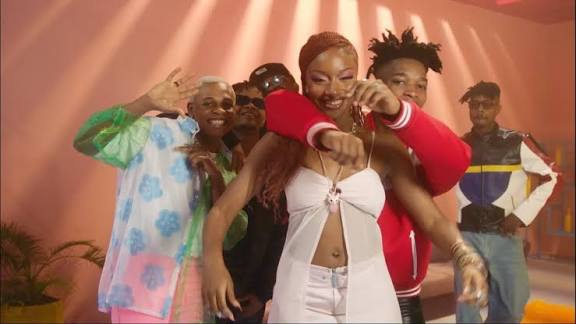
This collective identity culminated in the “Overdose” single (2022), a track that assembled Mavin’s roster into a showcase of unity—much like “Dorobucci” eight years earlier. But this time, the context was global. The video trended worldwide, and the song became a rallying anthem that reasserted Mavin’s dominance.
By branding its collective strength, Mavin differentiated itself from rival labels. Where others pushed individual artists as lone superstars, Mavin reminded the world that it was a nation of stars.
D) Shaping Afrobeats’ Global Identity
Mavin’s cultural impact during this period cannot be overstated. Rema’s rise, Ayra Starr’s breakout, and Don Jazzy’s digital persona all converged into a singular narrative: Afrobeats was no longer just Nigerian pop—it was global youth culture.
“Calm Down” was charting in India. Ayra Starr was headlining in Europe. Mavin artists were becoming faces of fashion campaigns, tech partnerships, and international festivals. Don Jazzy didn’t push them into these spaces with noise; he positioned them quietly, letting the music and personalities carry the empire outward.
By 2022, it was clear: Afrobeats had become a global language, and Mavin was one of its most fluent translators.
E) Culture by Silence
What stands out in this period is how little Don Jazzy said compared to how much he achieved. While industry feuds flared around him, while rivals chased headlines, he operated with restraint. He didn’t need to proclaim Mavin’s dominance—it was evident in the charts, the streams, the sold-out shows, and the digital ubiquity of his artists.
In a world obsessed with noise, Don Jazzy’s empire thrived by cultivating silence. And yet, in that silence, he shaped not just a label but a culture.
Inside Don Jazzy’s Quiet Power (2022–2023)
In an industry that thrives on spectacle, Don Jazzy’s most astonishing achievement is his ability to command power without demanding attention. His silence is not absence but presence—an aura that fills the room without a word spoken. While the Nigerian music scene is a theatre of noise, he has crafted a kingdom where quietness itself is strategy.
A) The Contrast With the Loud Kings
Consider his junior peers: Davido, Wizkid, Burna Boy. Their strategies are built on loudness—Davido’s boisterous generosity, Wizkid’s cryptic aloofness, Burna Boy’s fiery defiance. Each cultivates a myth that requires constant feeding: appearances, headlines, confrontations, and proclamations. Their brilliance is undeniable, but it is always loud.
Don Jazzy, by contrast, operates in the shadows. He does not need to trend on Twitter to prove relevance. He does not pick fights to prove dominance. He does not even insist on the spotlight when his artists succeed. Instead, he moves as an architect moves—measuring foundations, drawing blueprints, setting pillars that others later decorate with fireworks.
This contrast is not accidental. Jazzy has understood, perhaps more deeply than anyone, that in a volatile industry, silence is a fortress. It shields from scandal, it creates mystique, and it focuses attention not on the man but on the system he has built.
B) The Mentor, Not the Master
Inside Mavin, Don Jazzy’s leadership is not dictatorial but paternal. He is less a boss and more a mentor. Artists describe him as accessible, funny, and deeply invested in their personal growth. His ability to make younger talents feel safe in an industry that often exploits them is one of his strongest strategic assets.
This paternal aura also feeds into Mavin’s public image. Fans see him not as an untouchable mogul but as “Uncle Jazzy,” the approachable father figure of Afrobeats. It is a genius form of branding—by lowering himself in tone, he raises the empire in stature.
Unlike other executives who obsess over visibility, Don Jazzy has mastered invisibility as power. He often appears in artists’ videos as comic relief rather than authority, a deliberate choice that strips away hierarchy in public while maintaining respect in private. This creates an environment where creativity flourishes—artists are not stifled by the shadow of a domineering boss, but nurtured under the wings of a mentor.
C) Timing as a Weapon
Perhaps Don Jazzy’s greatest skill is timing. He rarely rushes announcements, rarely forces releases. His moves are almost always perfectly timed to maximize cultural impact.
Take Rema’s Calm Down. The original track was already a hit, but Don Jazzy and his team delayed the remix until the song had matured into a global anthem. Bringing in Selena Gomez at the height of its virality turned a regional hit into a historic crossover. The patience in that decision amplified its global effect, pushing the song onto Billboard charts and streaming milestones few African tracks had ever touched.
Timing also shaped Ayra Starr’s rise. Rather than flood her debut with collaborations or excessive marketing, Don Jazzy allowed her first singles to breathe, letting listeners connect with her personality before overexposure could dilute her brand. By the time “Bloody Samaritan” exploded, Ayra was not just another new voice; she was the face of a generational shift.
This use of timing is not loud but surgical—an invisible rhythm that governs Mavin’s growth.
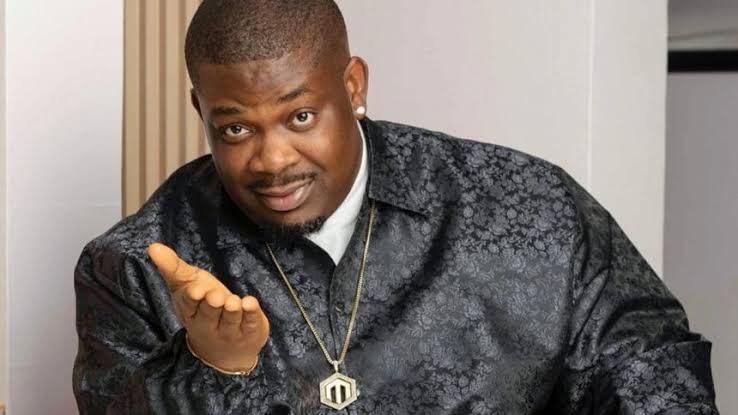
D) Silence as Reputation
In Nigeria’s music ecosystem, where conflict often doubles as marketing, Don Jazzy’s silence is itself a reputation. He rarely comments on controversies, even when they involve his artists. He lets storms blow over, knowing that the empire is stronger than a trending topic.
When Tiwa Savage departed for Universal Music, he responded with grace, framing it as a natural evolution rather than a betrayal. When rumors swirl about rivalries or financial challenges, he offers humor or deflection, never anger. This refusal to feed chaos has made him one of the most respected figures in the industry—not feared, not envied, but revered.
Silence also insulates his empire. By not attaching Mavin to petty battles, Don Jazzy preserves its brand integrity. Investors see stability. Fans see maturity. Artists see safety. The result is an empire that feels unshakable in an industry notorious for its turbulence.
E) Power Without Spotlight
Perhaps the most striking element of Don Jazzy’s quiet strategy is his disinterest in personal stardom. Unlike many producers who chase the spotlight, he rarely releases his own music. He avoids the temptation of turning himself into the star of his empire. Instead, he channels energy into making others shine.
This humility is deceptive—it looks like self-effacement, but it is actually power redistribution. By not competing with his artists, he allows them to trust him fully. By not centering himself, he ensures that Mavin is larger than Don Jazzy alone.
In this way, Don Jazzy has built a paradox: the less visible he becomes, the more powerful his influence grows. His invisibility is not weakness; it is strategy.
F) A Quiet King in a Loud Age
By 2023, as Afrobeats dominated global festivals, fashion campaigns, and Billboard charts, Don Jazzy’s fingerprints were everywhere yet invisible. Rema, Ayra Starr, Ladipoe, Magixx, Boy Spyce—all flourished under his system. Yet in interviews and headlines, it was the artists, not him, who took center stage.
This is the essence of his quiet power. Where others chase crowns, he builds kingdoms. Where others crave applause, he builds systems that outlast noise. Where others demand loyalty, he earns it by giving freedom.
Don Jazzy is not the loud king on the battlefield; he is the quiet king in the war room, mapping moves others will follow years later. His power is not in volume but in vision.
And as the Afrobeats wave surged into its global golden age, his empire stood as proof that sometimes, silence is the loudest sound of all.
Mavin as an Empire, Not Just a Label (2023–2024)
By the mid-2020s, Afrobeats was no longer the sound of Lagos alone; it was the sound of London, New York, Paris, and Rio. Nigerian music had broken past borders, but not all labels could scale with it. Many collapsed under the weight of ambition. Others became talent factories that lost their best acts to international majors. But Don Jazzy’s Mavin did not simply survive. It evolved into something larger than a record label—an empire with multiple arms, carefully constructed to withstand both the volatility of global music trends and the chaos of Nigeria’s industry.
A) The Mavin Academy: Factory of Stars
The most powerful engine of Mavin’s empire was not even the label itself but its talent academy. Unlike older labels that waited for street buzz before signing artists, Mavin built a pipeline where young talent could be scouted, trained, mentored, and shaped into stars.
This academy functioned like a conservatory, though with Afrocentric flair. Recruits learned not just music production and performance but also branding, stagecraft, and the subtle art of longevity. They were taught how to use social media strategically, how to handle interviews, and how to develop a visual identity that matched their sound.
This is how acts like Ayra Starr, Rema, Ladipoe, Crayon and Magixx could emerge fully formed, with the confidence of veterans despite their youth. The academy insulated them from the destructive tendencies that often swallow Nigerian artists early in their careers—poor contracts, mismanaged funds, overexposure.
What Don Jazzy was building was not just talent discovery. It was talent manufacturing, a systemized, replicable model that could churn out stars consistently, like Motown in Detroit’s golden era.
B) Expansion Into Tech and Branding
But Mavin was not only about music. By 2023, Don Jazzy and his team had begun investing heavily in tech-driven strategies. They understood that streaming algorithms and digital platforms, not radio, were the new gatekeepers of music.
Mavin partnered with data analytics firms to track global listening habits, identifying where songs were surging before the rest of the industry caught on. This allowed them to time international promotions with uncanny precision. For example, when Calm Down started picking traction on TikTok, Mavin was already positioning the track for cross-continental remixes and distribution pushes.
At the same time, the label expanded into branding and influencer marketing. Don Jazzy himself became a case study in personal branding—an elder statesman who could still trend on Instagram with humorous skits, endorsements, and meme-like relatability. Mavin artists mirrored this model, balancing cool artistry with accessible public personas.
This branding arm opened new revenue streams. Ayra Starr became a global fashion face, Rema partnered with brands outside music, and Don Jazzy himself signed deals that strengthened Mavin’s image as not just a music label but a cultural lifestyle brand.
C) International Capital and Scaling
The quiet but critical moment in 2019—when Mavin secured a multi-million-dollar investment from Kupanda Holdings—was still echoing in 2023–2024. That deal injected not only capital but also expertise, allowing Mavin to think like a multinational rather than a local label.
With Kupanda’s backing, Mavin expanded its distribution channels, created cross-border licensing partnerships, and strengthened its artist management infrastructure. This made it difficult for competitors to keep up. While other Nigerian labels scrambled to raise funds for promotions, Mavin was already operating with global machinery.
This financial muscle also allowed Don Jazzy to resist predatory deals from foreign majors. Instead of selling out his roster to international labels, he built bridges that allowed Mavin artists to collaborate globally without losing their independence.
The empire was no longer just African—it was structurally global.
D) The Architecture of Longevity
Mavin’s evolution into an empire was not only about money and branding; it was about longevity. Don Jazzy understood that the Nigerian industry has a brutal recycling rate—today’s star is tomorrow’s cautionary tale. His mission was to build a system where artists could sustain relevance for decades, not years.
This is why Mavin invests in artist rebranding and reinvention. Ladipoe, once boxed into niche rap, was repositioned as a mainstream hitmaker with Feeling. Ayra Starr was transformed from a teenage debutant into the globally recognized “Sabi Girl.” Rema, initially dismissed as experimental, was polished into an Afrobeats ambassador with crossover hits.
Each reinvention was deliberate. It meant that Mavin artists did not fade once the novelty wore off; they evolved into new forms that kept them fresh in the public imagination.
E) Don Jazzy’s Invisible Succession Plan
Behind all of this, Don Jazzy was already preparing for something most industry leaders avoid—succession. He understood that no king reigns forever, and empires collapse when leadership refuses to pass the torch.
Instead of hoarding power, Jazzy quietly nurtured a second tier of executives within Mavin. Artists themselves began taking on mentorship roles for younger signees. Business managers were trained to run independent arms of the empire. By distributing responsibility, Jazzy ensured that Mavin could one day outlive him.
It is this foresight that makes the label feel more like a dynasty than a startup. The idea is not simply to dominate Afrobeats today but to remain central to African music for the next 20 years.
F) Empire in the Cultural Imagination
By 2024, Mavin was no longer spoken of as just a record label. In Nigeria’s cultural imagination, it had become a metaphor for order in chaos. Where smaller labels collapsed after one or two hitmakers, Mavin proved that structure could create sustainability. Where scandals destroyed reputations, Mavin stood as the clean house of Afrobeats. Where stars often clashed with their mentors, Mavin was seen as a family—sometimes loud, sometimes messy, but intact.
This cultural perception amplified the empire’s power. To be signed to Mavin was no longer just a career opportunity; it was a status symbol. It meant you had entered a lineage, a system that promised both protection and possibility.
G) A Global Blueprint Emerging
As Afrobeats festivals began dominating European summers and American streaming charts, whispers grew louder: Could Mavin become the Motown of Africa? Could it scale to rival global record giants?
Already, its blueprint was being studied across the continent. Labels in Kenya, Ghana, and South Africa began imitating its academy system. African entrepreneurs discussed the “Mavin model” as proof that African businesses could grow global without losing cultural authenticity.
In that sense, Don Jazzy had created not just an empire but a prototype for African creative industries.
And yet, even in 2024, as Mavin’s global reach expanded and its artists stood shoulder to shoulder with the world’s biggest names, Don Jazzy himself remained true to his quiet strategy. No flamboyant declarations, no desperate claims of being number one. Only the work spoke.
The empire was loud, but the emperor remained silent.
The Legacy in Motion (2024–2025)
By 2024, Afrobeats was no longer knocking at the world’s doors; it was hosting the party. Nigerian sounds filled festival stages in Paris, stadiums in Atlanta, and billboards in Tokyo. Streaming platforms crafted entire playlists around Afrobeats, fashion houses booked its stars, and global pop icons sought its collaboration. In this grand performance of cultural ascendance, Don Jazzy did not stand on the stage waving a flag. He stood in the wings, watching his empire move like a living organism.
A) The Weight of a Living Legacy
Most legacies are written after a life has been lived. Don Jazzy is one of the rare figures writing his own legacy in real time. His choices in 2024 and 2025 are not just business moves; they are historical brushstrokes that will determine how future generations remember the rise of Afrobeats.
Unlike many pioneers who burned brightly but left little behind, Jazzy is intent on building something durable. This is why the word “legacy” clings to his name so often in conversations about African music. His story is not a tale of fleeting genius but of sustained architecture.
B) The Afrobeats Expansion War
By 2025, Afrobeats is entering what some call the expansion war. Global majors are pouring money into the sound. Streaming companies are fighting for exclusive rights to artists. Foreign A&Rs fly into Lagos weekly, searching for the “next Rema.” The risk, however, is that Afrobeats could become diluted—a global fad rather than a lasting cultural export.
Here, Don Jazzy’s quiet strategy shows its sharpest edges. Rather than racing into every deal or pushing his artists into oversaturated markets, he plays the long game. He ensures Mavin’s stars diversify into fashion, film, and philanthropy, embedding themselves in culture, not just charts. He turns down contracts that look shiny but compromise independence. He shields his young signees from burnout by staggering releases, refusing to let hype devour them too soon.
In an age of expansion, restraint becomes his weapon.
C) Mentorship Beyond the Label
By 2025, Don Jazzy is no longer just a label boss—he is a cultural mentor for Afrobeats itself. Younger label executives, producers, and even rivals look to him for cues. His Instagram banter, which once felt like comic relief, now reads like parables—short bursts of wisdom disguised as humor.
His influence extends into public expectations of leadership. In an industry that often rewards flamboyance and chaos, Jazzy embodies stability. He shows that you can be wealthy without arrogance, powerful without cruelty, and globally relevant without abandoning your roots. This image shapes not only Mavin but the very definition of African executive power.
D) The Artists as Legacy-Bearers
Legacy is not carried in buildings or bank accounts; it is carried in people. For Don Jazzy, Rema, Ayra Starr, Ladipoe, and the younger Mavin acts are more than artists—they are custodians of his vision.
Rema has become the global face of new Afrobeats, performing at arenas that older generations of Nigerian stars could only dream of. His success validates Mavin’s system and cements Don Jazzy’s reputation as a kingmaker.
Ayra Starr has grown into a generational icon, redefining what it means to be a female superstar in Africa, and challenging the gendered limits of the industry. Her global rise reflects Jazzy’s ability to position his artists not just as Nigerian stars but as international figures.
Ladipoe stands as proof that Mavin can turn unlikely genres into commercial gold. His sustained career challenges the myth that rappers cannot thrive in Nigeria.
The new recruits—Boy Spyce, Magixx, and others—represent the future. Their careers are still unfolding, but each success story adds another layer to Don Jazzy’s architecture of permanence.
Through them, his legacy is not abstract; it is embodied.
E) Succession in Sight
By 2025, whispers grow louder: who will inherit Mavin when Don Jazzy eventually steps aside? Unlike many leaders who leave succession vague, Jazzy has already laid down frameworks. Senior managers have taken larger roles. Artists themselves are learning to mentor new signees. Even the fanbase understands Mavin as a collective more than a one-man show.
This is deliberate. Don Jazzy is building not just a company but a continuity. His greatest victory will be if Mavin thrives long after his own exit, the way Motown survived Berry Gordy or Def Jam outlived Russell Simmons.
F) The Spiritual Dimension of Strategy
What makes Don Jazzy’s story so captivating is not just the mechanics of his empire but the almost spiritual aura surrounding his leadership. In a society where fame often destroys character, his refusal to scandalize, to chase clout, or to betray trust feels like a moral stance.
His silence is not empty; it is sacred. His humor is not frivolous; it is disarming. His mentorship is not transactional; it is familial. In this way, he represents something deeper than a businessman. He represents an alternative model of power in Nigeria—soft, quiet, yet unshakably firm.
G) The Mavin Model and Africa’s Future
What Don Jazzy has built is bigger than music. The Mavin Model has implications for the broader African creative economy. It shows that African businesses can:
- Build sustainable systems rather than rely on individual genius.
- Expand globally without erasing cultural identity.
- Attract investment while retaining independence.
- Create brands that are both profitable and deeply human.
In that sense, Mavin is not just a label—it is a case study in African possibility. If Africa’s film, fashion, and tech industries adopt similar models of structure, mentorship, and patient scaling, they too could build empires that compete globally.
H) The Unfinished Symphony
And yet, even with all this, Don Jazzy’s story feels unfinished. Perhaps that is his greatest trick—always leaving the sense that there is more to come. Each artist signed, each partnership announced, each humorous Instagram post carries the weight of continuity.
For fans, he remains “Uncle Jazzy,” the man who seems to belong to everyone yet fully to no one. For industry insiders, he is the benchmark, the one who turned silence into strategy and built an empire with humor as much as with money. For history, he is already a legend—but a living one, still shaping the narrative as he walks.
I) Towards Immortality
Legacy, at its highest form, is immortality. Don Jazzy’s quiet strategy has placed him on that path. Not the immortality of marble statues or dusty textbooks, but the immortality of influence—echoing through every Afrobeats beat that plays in a Tokyo club, every Ayra Starr lyric shouted in Paris, every Rema dance that goes viral in São Paulo.
His name may not always be in the headline, but his fingerprints will remain on the culture for generations.
Don Jazzy, the man who once played backup instruments in a London church, now conducts the orchestra of Afrobeats’ global dominance. And he does it all without raising his voice.

Conclusion — The Empire and the Silence (2025 and Beyond)
Don Jazzy once stood as a young boy in Ajegunle, watching a world that offered little promise. Today, he stands as a quiet emperor of sound, guiding an empire that has carried Nigerian music to the farthest corners of the earth. He did not get here by shouting. He did not get here by fighting. He got here by listening—listening to talent, to timing, to silence itself.
And so, his story closes not with an exclamation but with a pause. A quiet, deliberate pause that feels less like an ending and more like a breath before the next movement.
Because for Don Jazzy and the Mavin Empire, silence is not the absence of music. It is the space that makes the music eternal.





